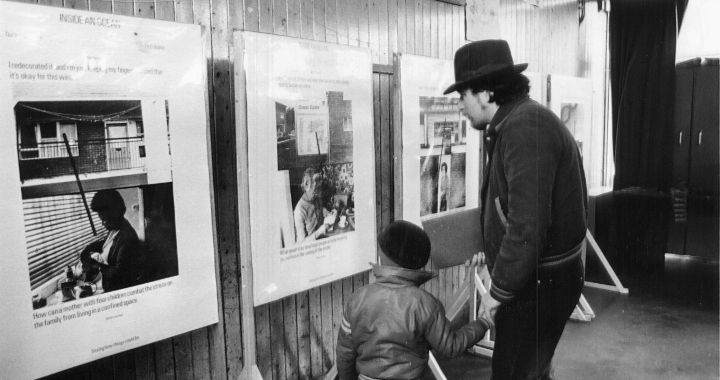Stephen Willats – conceptual art that is socially and politically relevant

Display Boards from Stephen Willats’ project work Inside An Ocean during the 1979 exhibition Concerning Our Present Way of Living. Photograph courtesy of Stephen Willats
Since the French art critic and curator Nicolas Bourriaud coined the term ‘relational aesthetics’ to describe an artistic practice centred on human interaction and experience in the late 1990s, a great deal of traction has been given to the idea of artworks as models for living and action.
In many ways London-born conceptual artist Stephen Willats was way ahead of the game. He studied at the Ealing School of Art in the early 1960s and, influenced by cybernetics and the science of communication, became a pioneer of collaborative, socially-engaged art created in site-specific contexts.
Commissioned to produce a solo show for the Whitechapel Gallery in 1979, Willats involved people from the local area, initiating projects with leather and textile workers from in and around Brick Lane, labourers at the West India Dock and residents from the Ocean housing estate in Tower Hamlets.
Twenty-five years on, Willats’ exhibition is being revisited in a new archive display at the Whitechapel featuring works on loan from the Tate, the Middlesborough Institute of Modern Art and the Museum of London alongside documentary material from the artist’s personal archive.
“Willats always imagined the artist’s role as a social and political one and the archive display is a chance to reflect on an early example of an artist engaging with the local community,” says exhibition curator Nayia Yiakoumaki.
Part of the new archive display is dedicated to Willats’ work with residents on the Ocean housing estate, including a series of tape recordings and diagrams produced by Willats reflecting how people felt about their living conditions, from damp-ridden walls to the lack of facilities for children.
Now the subject of a £200m programme of regeneration works carried out by the East Thames Consortium, the archive display at the Whitechapel Gallery opens a window on the history of the community on the Ocean Estate, one of the oldest, largest and most impoverished in the country.
“In one sense there’s the art historical element to the archive exhibition, the chance reexamining of an early example of community engaged artistic practice pioneered by Willats in the more recent context of relational aesthetics,” Yiakoumaki says.
“On the other hand it presents a slice of history contrasting the very different reality of the East End amid financial crisis in the seventies with the here and now, something which I think newer residents to the area forget.”
Stephen Willats: Concerning Our Present Way of Living is at Whitechapel Gallery until 14 September. 77-82 Whitechapel High St, E1 7QX
